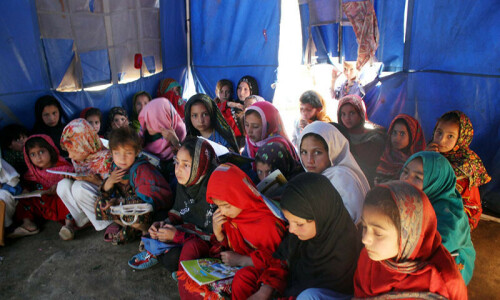SEVEN soldiers paid the ultimate price in Lakki Marwat on Sunday when their vehicle was blown up in an IED attack, another painful reminder of the state’s inability to effectively counter rising terrorism. That same night, policemen successfully defended their post in Bajaur from a militant attack with no loss of lives. While we may be grateful for small mercies, it must be acknowledged such incidents are occurring with alarming frequency: CRSS data shows 281 fatalities of civilians and security personnel in the first quarter of 2024. This necessitates action on a war footing.
Several pivotal developments have led to the resurgence of terrorist activities in Pakistan, notably the Afghan Taliban’s takeover of Kabul in 2021. The collapse of the ill-advised ceasefire with the banned TTP has only exacerbated the situation. Meanwhile, Kabul’s reluctance to rein in the group and ensure Afghan soil is not used for launching attacks against Pakistan has made an already messy situation even messier. Despite repeated diplomatic engagements and cross-border actions, the Taliban have shown little inclination to curb the activities of their ideological brethren. And so, an emboldened TTP has been able to regroup and mount sophisticated attacks against targets inside Pakistan. The presence of TTP sanctuaries in Afghanistan, reportedly supported by modern weapons and financial aid from the Taliban, poses a significant threat to Pakistan’s national security.
To counter this escalating threat, Pakistan must develop a strategy that integrates both military and civilian efforts. The National Action Plan needs to be revitalised and enforced with renewed vigour. Our security forces need to be adept at handling asymmetric warfare including detecting and defusing IEDs, urban combat, and intelligence gathering. The military must be supported by well-trained, well-equipped police forces to ensure a holistic approach to counterterrorism. Ensuring that no space is available to militants and their sympathisers is just as crucial. This includes rigorous monitoring of educational institutions, madressahs, and other potential recruitment grounds for extremists. The state must also cut off funding sources for terrorist groups. Border security is another area to consider. This involves not only physical barriers but also the deployment of advanced surveillance technologies and increased patrols to prevent cross-border infiltration by militants. All the while, diplomatic efforts must continue to exert pressure on the Afghan Taliban to take concrete actions against the TTP. This should be complemented by engaging with stakeholders such as China, Russia, Iran and the UAE, to form a united front against the threat posed by Afghanistan-based militants. The battle against terrorism is not solely the responsibility of the military. Civilian institutions, LEAs, and society at large must get to work to counter this menace. The martyrdom of our security personnel must not go in vain.
Published in Dawn, June 12th, 2024








































Dear visitor, the comments section is undergoing an overhaul and will return soon.